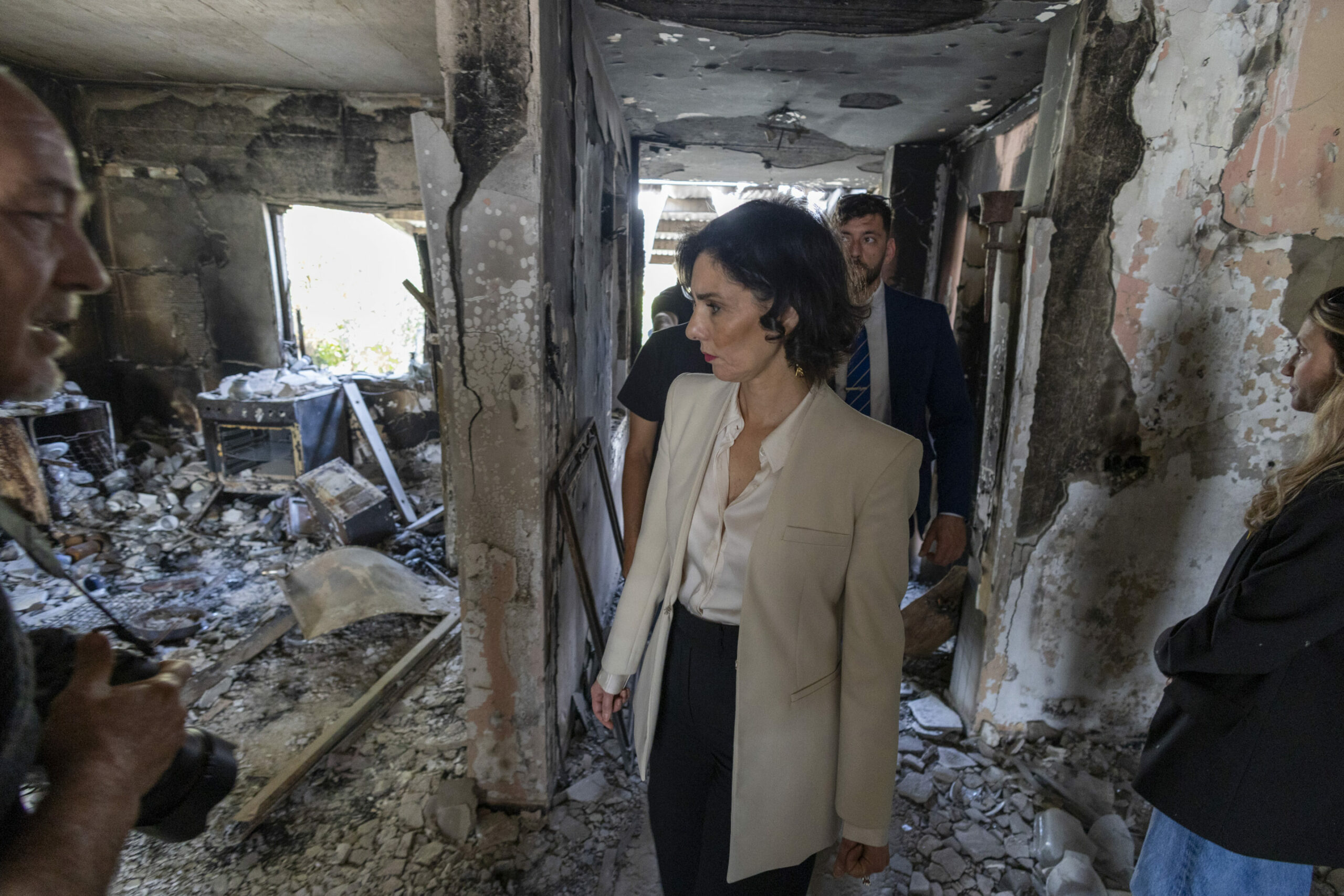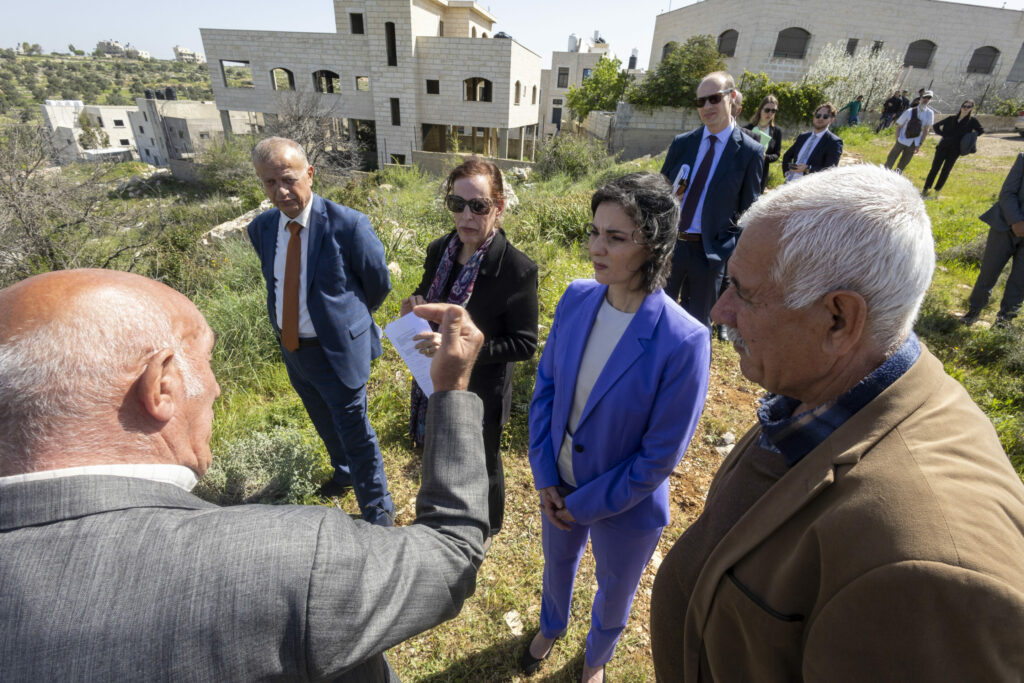Belgian Foreign Minister Hadja Lahbib is on a three-day diplomatic mission to Israel and the West Bank this week, as international pressure grows on Israel not to launch an offensive in Rafah.
During the visit, Lahbib reiterated the call for an immediate ceasefire in the Gaza Strip, the release of Israeli hostages and a two-state solution.
"I called for an immediate ceasefire and full access to humanitarian aid. It must reach the people of Gaza without delay. The situation is deteriorating every day, Lahbib said, "The planned offensive on Rafah must not be launched. It would have dramatic consequences."
Foreign Minister Lahbib also shared condolences for the Israeli victims and reiterated our full commitment to advocating for the immediate release of the Israeli hostages still held by Hamas. She also called for a thorough international investigation into attestations of sexual violence which took place during the Hamas attack on 7 October 2023.
Lahbib, who has made the fight against sexual violence one of her priorities, met with Orith Solitziau, the director of the Association of Rape Crisis Centres in Israel (ARCCI), and gynaecologist Dvora Bauman of Hadassah Hospital in Jerusalem.

Foreign Minister Hadja Lahbib pictured during a visit to the Kibbutz Nir Oz, on the first day of a diplomatic mission to Israel and the Palestinian territories, Wednesday 27 March 2024. Credit: Belga / Nicolas Maeterlinck
The day began with a tour of Nir Oz kibbutz, alongside Israeli Foreign Minister Israel Katz, which took place within a tense atmosphere. The kibbutz is among the 22 locations targeted by Hamas during their terror attack.
According to Katz, Israel's fight against Hamas is directed towards "radical Islam, rather than Islam as a whole." Having been faced with similar issues in Belgium, Katz acknowledged differences in Belgian and Israeli diplomatic positions.
Tensions rose further when Katz reportedly suggested that Gaza is receiving the same amount of aid it's demanding, leading to Lahbib toughening her stance. When asked about the threat of starvation in Gaza, the Israeli diplomat refrained from commenting, with Lahbib cutting their interview short, deeming it inappropriate to discuss this matter.
'Cut my water, electricity'
On Thursday, Lahbib was in the West Bank and issued a stark condemnation of the Israeli settlements.
"Belgium condemns the settlements and has decided to impose sanctions against violent settlers," she said. "These settlements are illegal under international law. Hadja Lahbib referred to some 180 Israeli "outposts" located in zone B, i.e. in the Palestinian zone under the 1993 Oslo agreements.
“Since the attacks by the Palestinian terrorist group Hamas on 7 October, 23 new outposts have been built. There are 4 to 5 attacks per day against Palestinians," Lahbib continued.
In the West Bank, Lahbib visited Palestinian villagers who were forced to leave their homes in the face of Israeli settler violence – one of them testified his experience to the foreign minister as loud music could be heard from the Israeli settlement on the hill, Belga News Agency reports.
"On the first day, they cut off my water and electricity. On the second day, they broke into my house and forced me to leave." This resident of the village of Mazra'ah Al Qibliyah, in the occupied West Bank, told Foreign Minister Lahbib how he was forced to leave his home by Israeli settlers.

Foreign minister Hadja Lahbib and Palestinian former Prime Minister Mohammad Shtayyeh pictured during a meeting of the Belgian Foreign Minister in Ramallah in the West Bank. Credit: Belga / Nicolas Maeterlinck
In response to this situation, Belgium is funding the West Bank Protection Consortium, which is helping the Palestinians defend themselves and their land.
Last week, EU foreign ministers reached an agreement on the adoption of sanctions against violent Israeli settlers, at Belgium's instigation during its rotating presidency of the EU Council. In addition to a ban on entry to European territory, these sanctions mainly concern a freeze on their assets.
The issue of importing products from the settlements continues to be debated in Belgium. According to Belgian diplomats, Belgium's policy of differentiating these products is "above average". Belgium continues to adhere to three principles: stricter import controls, the inclusion of a territorial clause in all treaties negotiated with Israel, and the provision of information to Belgian companies.
In fact, all agreements with Israel already has a territorial clause, agreed with the Israeli government, excluding entities operating in the occupied territories from benefitting from EU funding. Furthermore, it is already up to the EU member states to decide on labelling of Israeli products from the territories.
As for an outright ban, Belgium continues to advocate an agreement within the European framework and in compliance with World Trade Organisation (WTO) rules. "For Belgium to do this on its own is tantamount to attacking the arrival of these products alone. Arrivals will turn to other ports," Lahbib told the House Committee just before she left for the Middle East.
According to diplomatic sources, the volumes arriving in Belgium from the settlements are low. However, the government agreement provides for the possibility of taking "further steps" in this policy of differentiation.
The day continued with bilateral talks with Palestinian Foreign Minister Riyad al-Maliki, followed by outgoing Prime Minister Mohammad Chtayyeh and the President of the Palestinian Authority Mahmoud Abbas.

